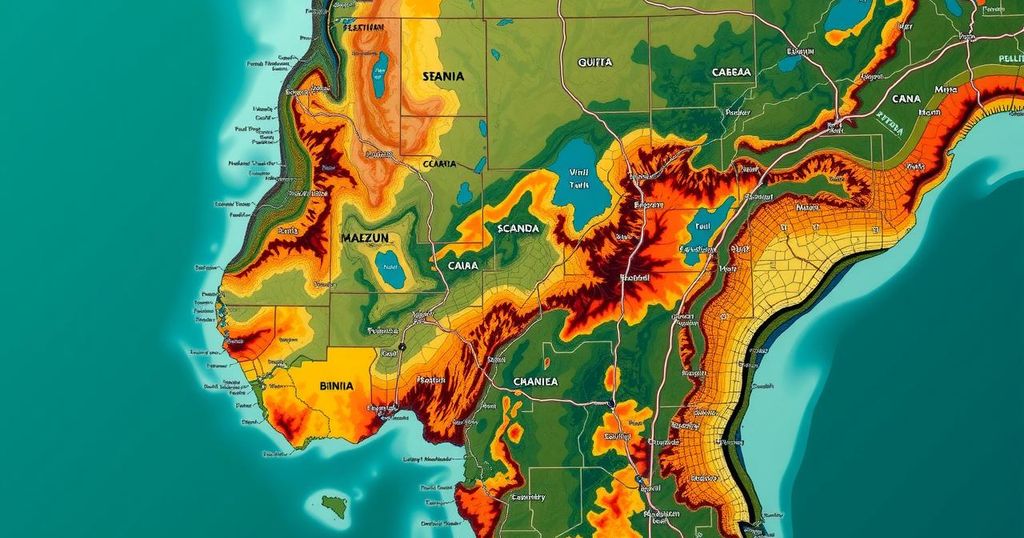Strengthening Climate Resilience and Sustainable Development in Guinea-Bissau
The Country Climate and Development Report (CCDR) for Guinea-Bissau outlines the necessity of strengthening governance and financial systems to enhance climate resilience. Despite its natural resource wealth, the country faces high poverty and significant developmental challenges exacerbated by climate change. The report emphasizes an integrated approach that includes climate-smart agriculture, energy access, and community-based strategies to foster sustainable growth over the next three years.
The newly released Country Climate and Development Report (CCDR) emphasizes that enhanced institutional and financial systems are vital for promoting climate resilience and sustainable growth in Guinea-Bissau. Despite ranking as the nation with the highest natural capital per capita in West Africa, Guinea-Bissau confronts formidable developmental challenges, including high poverty rates, persistent political instability, and an economy heavily reliant on cashew nuts, compounded by extremely low electricity access rates. The impacts of climate change are acutely felt, particularly by vulnerable populations in low-lying coastal regions and communities reliant on agriculture and fisheries. In the absence of effective adaptation measures, existing poverty levels may further escalate due to increasing climate risks. The report underscores the necessity of good governance, political stability, and an investment-friendly environment to cultivate a sustainable growth model for Guinea-Bissau. Rosa Brito, the World Bank Group’s Resident Representative in Guinea-Bissau, notes, “The Country Climate and Development Report provides Guinea-Bissau with a strategic framework to align development goals with climate action, promoting positive transformations and sustainable growth.” The report cautions that although Guinea-Bissau possesses rich natural resources, its high vulnerability to climate shocks necessitates immediate action. To effectively tackle climate vulnerabilities, the CCDR advocates for a comprehensive strategy that includes enhancing governance, diversifying the economy, preserving natural capital, investing in human capital, and implementing sustainable agricultural and infrastructural developments. The report identifies pressing priorities for the next three years that include the adoption of climate-smart agriculture, regeneration and protection of forest ecosystems, bolstering energy accessibility, and enhancing human capacity through knowledge systems. The CCDR illustrates that climate action is not only compatible with development objectives but is essential for allowing Guinea-Bissau to meet its long-term development goals. It concludes that nations that experience rapid growth and prosperity will be better prepared to mitigate the adverse effects of climate change, thereby asserting that sustainable, equitable growth is crucial for Guinea-Bissau in addressing the global climate crisis.
Guinea-Bissau, despite its vast natural resources, grapples with significant socio-economic challenges including high poverty rates and political instability, which hinder its development. The country has the highest natural capital per capita in West Africa, yet over-reliance on a single cash crop, coupled with inadequate infrastructure and low access to electricity, limits economic progress. Climate change exacerbates these vulnerabilities, threatening agriculture, fisheries, and vulnerable coastal communities, making institutional reform and sustainable investments critical for future resilience and growth. The Country Climate and Development Report (CCDR) delineates a path forward, suggesting immediate actions and a comprehensive approach to enhance climate resilience while focusing on sustainable development objectives.
In summary, the Country Climate and Development Report highlights the critical interdependence of climate resilience and sustainable development in Guinea-Bissau. It outlines the urgent need for improved governance and structural reforms to address the myriad challenges facing the nation. With a clear framework established by the CCDR, Guinea-Bissau can align its developmental ambitions with climate action, ultimately fostering a more resilient and equitable future for its populace. The report’s recommendations provide a roadmap for navigating the intersection of climate change and development, making it essential for the country’s sustainable growth trajectory.
Original Source: www.miragenews.com




Post Comment